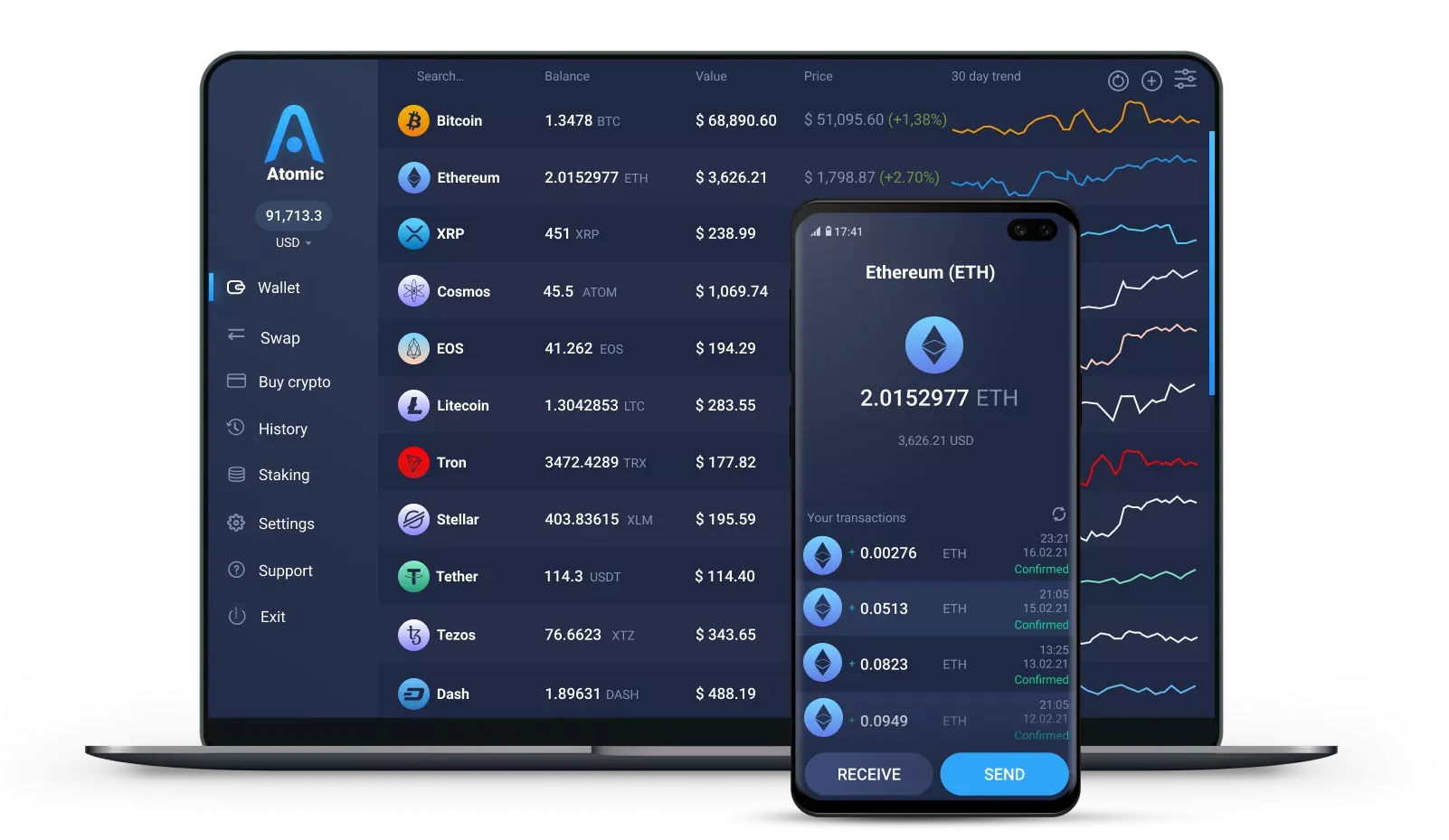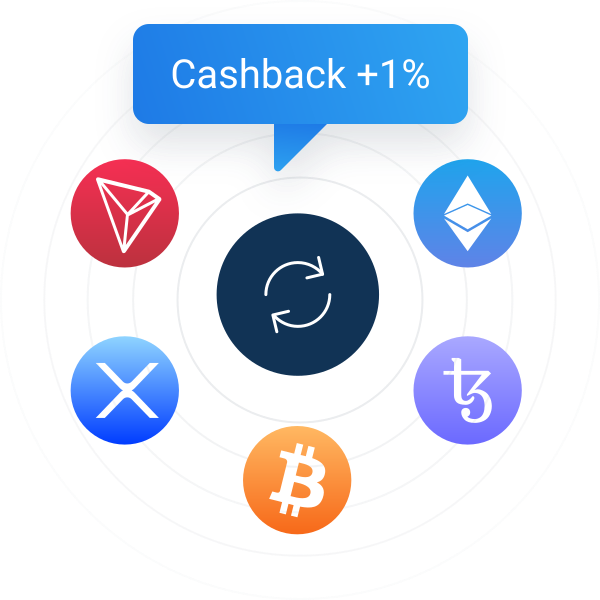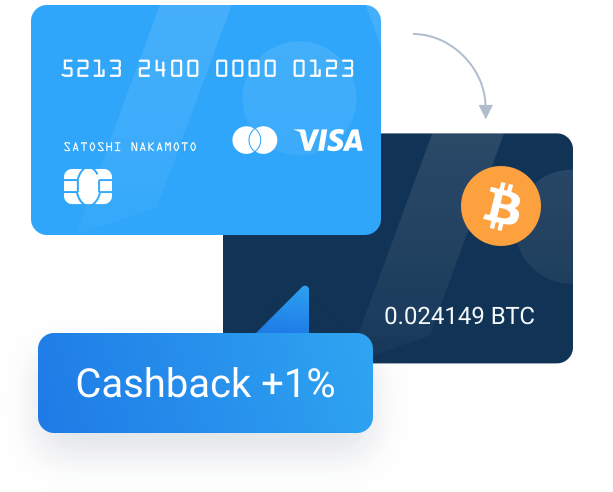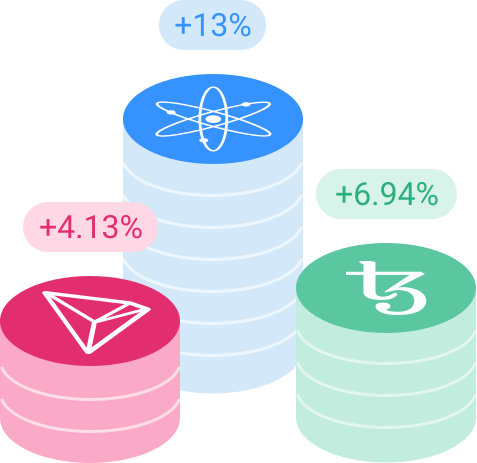
Ethereum (ETH) wallet
Manage your Ethereum, XRP, Litecoin, XLM and over 1000 other coins and tokens.
Trusted by 10,000,000 users worldwide


Instant Swap with Cashback
Swap Ethereum for 1000+ crypto pairs anonymously and get up to 1% cashback
Buy Crypto
across the world.


Trusted Reviews
Why Choose Atomic Ethereum wallet

Private
No registration and KYC required to use the app. We don't track your data

Secured
Your private keys are encrypted and never leave your device. Only you have control over your funds

24/7 Online Support
Fast support for your needs. Live chat and email support for customers from all over the globe.
Download Atomic Wallet
Windows
MacOS
Ubuntu
Debian
Fedora
What is Ethereum Wallet?
Diving into the world of cryptocurrency begins with understanding the basic tools, particularly wallets. For those interested in Ethereum, a leading cryptocurrency, knowing your ethereum wallet options is crucial.
Understanding Ethereum Wallets
An Ethereum wallet, like other cryptocurrency wallets, is a digital tool that allows you to store, send, and receive Ethereum (ETH). It’s akin to a bank account for your digital currency. However, unlike a traditional bank account, an Ethereum wallet gives you full control over your assets. It uses a pair of cryptographic keys: a public key, which is your wallet address, and a private key, which is like your password.
Ethereum wallets come in various forms. Some are software-based and exist on your computer or smartphone, offering convenience and easy access. Others are hardware devices that store your keys offline, adding an extra layer of security.
There are also online wallets, which are web-based, and paper wallets, which are physical printouts of your keys. Each type of wallet has its unique set of features, benefits, and security measures.
A few examples of Ethereum wallets include Atomic Wallet, a user-friendly option used by over 10,000,000 users worldwide; Ledger Wallets, which offer high security by storing keys and signing transactions offline; and Trust Wallet, known for its strong safeguards and optimized Web3 experience.
Importance of Ethereum Wallets
Ethereum wallets play a crucial role in managing and utilizing your Ethereum. They provide a secure and personal way to manage your assets, which is essential in the decentralized world of cryptocurrencies.
Your Ethereum wallet allows you to participate in the wider Ethereum ecosystem. It enables you to send and receive Ethereum, participate in DeFi (Decentralized Finance) applications, and even create and interact with smart contracts on the Ethereum blockchain.
Without an Ethereum wallet, you would not be able to access or control your assets. Therefore, choosing the right Ethereum wallet that suits your needs and ensures the safety of your assets is paramount.
In the following sections, we’ll explore in detail the features and benefits of various Ethereum wallets, helping you to make an informed decision about the best one for your needs. This includes popular options like Atomic Wallet, Ledger Wallets, MyEtherWallet (MEW), and Trust Wallet.
Remember, the safety of your assets should be your top priority when choosing an Ethereum wallet. Always consider the reputation, security features, ease of use, and compatibility with other platforms when evaluating your options.
Review of Atomic Wallet
As a beginner investor venturing into the world of cryptocurrency, one of the essential tools you’ll need is a reliable Ethereum wallet. One such wallet that has gained popularity among users around the globe is the Atomic Wallet.
Features of Atomic Wallet
Miner fees are dynamic and always make the news because they’re so high. They’re not always so high, but Bitcoin has gone through several periods where network congestion made miners’ fees very high. In other words, if many transactions are happening in the system, the miners’ fees would likely be very high due to the congestion. That’s comparable to Uber rates during rush hour.
To put things into perspective, in April and May 2021, many transactions were happening on the market, making fees as high as $50. They were also very high back at the end of 2017 when Bitcoin hit a price record shy of $20,000.
Imagine you want to send a friend $20 worth of Bitcoin, but the fee alone costs $50. Transaction fees like that would make you not want to use it, except for larger transactions. People began to jump on the Bitcoin bandwagon when its price skyrocketed. All that activity led to high miners’ fees, which caused a lot of complaints. Now, fees are generally much lower.
The number of inputs on a transaction could also cause higher fees. If you send some Bitcoin and it’s broken up into smaller pieces, these smaller pieces add more memory to the transaction. That means they’ll be processed with a larger memory size, and the miners’ fees will increase as they incur a higher cost.
Let’s address the elephant in the room. Why do fees exist, to begin with?
These fees give incentives to the miners to verify the blocks. Miners verify each block using mining machines that crunch the numbers on the cryptographic puzzles. When the miners complete a block, they receive some Bitcoin as a reward.
Regarding rewards, miners can prioritize which transactions they include in a block. The higher the miner fee, the higher the chances the miner will include it in the current block. In some cases, if your transaction carries a lower fee, it might take a few blocks until a miner picks up your transaction, puts it into a block, and verifies it. That way, the mining system is incentivized for the miners, too.
Bitcoin blockchain can only progress with the miners who complete transactions. That’s why the miners and their fees are critical to the Bitcoin ecosystem.
Another important thing to mention is how to pay the miners’ fees. Don’t worry: most wallets will include that in your transaction. They’ll deduct the miners’ fees from the amount you’re sending.
Benefits of Using Atomic Wallet
There are several benefits of using Atomic Wallet as your preferred Ethereum wallet. Firstly, the wide range of features offered by Atomic Wallet makes it a versatile tool for managing your crypto investments. Whether you want to buy, swap, stake, or store your Ethereum, you can do it all from one plat form.
Secondly, the ability to swap Ethereum for over 1000+ crypto pairs means you have the flexibility to diversify your portfolio as per your investment strategy. Plus, you can do this while remaining anonymous, adding an extra layer of privacy to your transactions.
In addition, the staking feature of Atomic Wallet allows you to earn passive income from your Ethereum and other crypto assets. This can be a great way to maximize your returns, especially in a volatile crypto market.
Lastly, Atomic Wallet supports buying Ethereum and other assets using a bank card and accepts various local currencies. This makes it a convenient and accessible choice for users across the globe.
In conclusion, Atomic Wallet is a powerful tool that offers a range of features to cater to the diverse needs of crypto investors. Whether you are new to the world of crypto or an experienced investor, Atomic Wallet can be a great choice for managing your Ethereum investments. Whether you’re looking for an XRP wallet, a USDT wallet, or exploring how to stake Cardano, Atomic Wallet has you covered.
Choosing the Right Ethereum Wallet
When it comes to interacting with the Ethereum network, the right wallet can make a significant difference. With a range of options available, it’s important to consider several factors to ensure you’re choosing the best Ethereum wallet to meet your needs.
Factors to Consider
When selecting an Ethereum wallet, consider the following:
1. Functionality: Look for a wallet that supports a wide range of operations, from simple transactions to more complex blockchain interactions like swapping, staking, and managing NFTs.
2. Security: The wallet should offer robust security features to protect your assets. Look for wallets that store private keys offline, provide strong safeguards, or use advanced encryption methods.
3. Ease of Use: The wallet should have a user-friendly interface that makes it easy to check balances, track transaction histories, and perform transactions.
4. Fompatibility: The wallet should be compatible with various platforms, such as desktop, mobile, or hardware devices.
5. Support for Assets: Ensure the wallet supports Ethereum and other assets you plan to use. Some wallets also support all ERC-20 tokens.
6. Additional Features: Some wallets offer additional features like the ability to buy Ethereum directly using a bank card in various currencies or earn crypto rewards.
Making an Informed Decision
Remember, it’s not just about storing your Ethereum securely; it’s about being able to interact with the Ethereum network in the way that suits you best. Whether that’s staking to earn rewards, buying and selling on the go, or simply keeping your Ethereum safe, the right wallet is a key part of your Ethereum journey.





